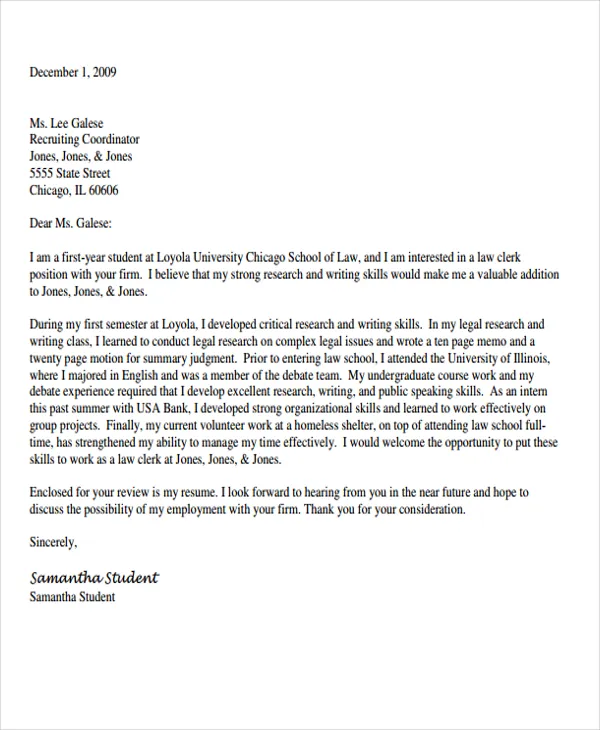Understanding the Importance of a Law Student Internship Cover Letter
A law student internship cover letter is your first impression. It’s a crucial document that can make or break your chances of securing a coveted internship. Unlike a resume, which simply lists your qualifications, a cover letter allows you to showcase your personality, articulate your interest in the specific opportunity, and explain why you are the perfect fit for the role. A well-crafted cover letter demonstrates your communication skills, attention to detail, and genuine interest in the legal field. Failing to submit a strong cover letter can signal a lack of professionalism or a lack of understanding of the application process, both of which can lead to rejection. It’s your chance to shine, so invest the time to make it outstanding. This guide will show you how.
Key Components of a Winning Cover Letter
A compelling cover letter is not just a formality; it’s a strategic tool. It requires a thoughtful approach, ensuring you present yourself in the best possible light. Every section of your cover letter should serve a purpose, contributing to a cohesive narrative that highlights your strengths and demonstrates your suitability for the internship. From the moment the hiring manager begins reading, your goal should be to captivate their interest, making them eager to learn more about you. This involves a strategic layout of content.
Your Contact Information and Date
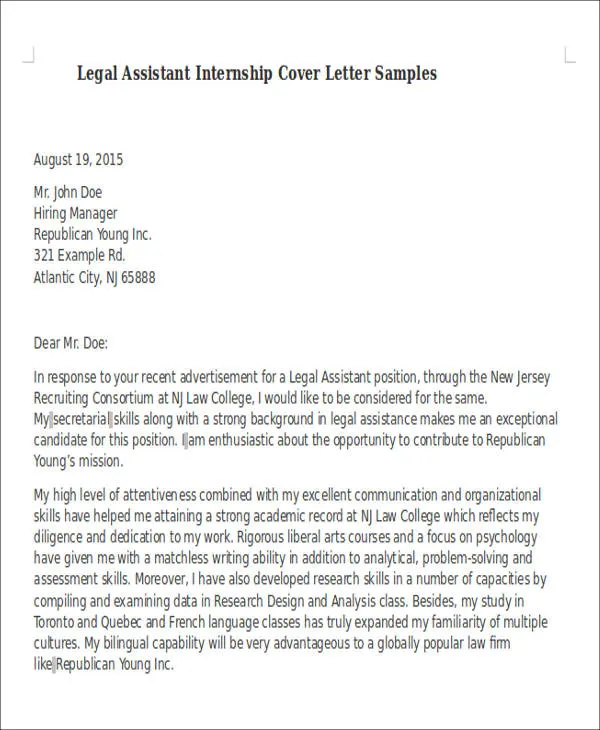
Start your cover letter by providing your contact information, including your name, phone number, email address, and LinkedIn profile (if applicable). This information should be clearly displayed at the top of the letter. Following your contact information, include the date you are writing the letter. This ensures that the recipient knows when the letter was written.
Address the Hiring Manager Directly
Whenever possible, address the hiring manager or the specific person responsible for reviewing applications by name. Research the firm or organization to find out who will be reading your cover letter. If you cannot find a specific name, use a professional salutation such as “Dear Hiring Manager.” Avoid generic greetings like “To Whom It May Concern,” as they show a lack of effort.
Opening Paragraph Captivate the Reader
Your opening paragraph is your chance to grab the reader’s attention. Immediately state the position you are applying for and how you found the opportunity. Then, concisely state your enthusiasm for the internship and why you’re a strong candidate. Highlight a key skill or experience that directly aligns with the internship requirements to create immediate interest. Make sure this section is brief, focused, and engaging.
Highlight Your Relevant Skills and Experience
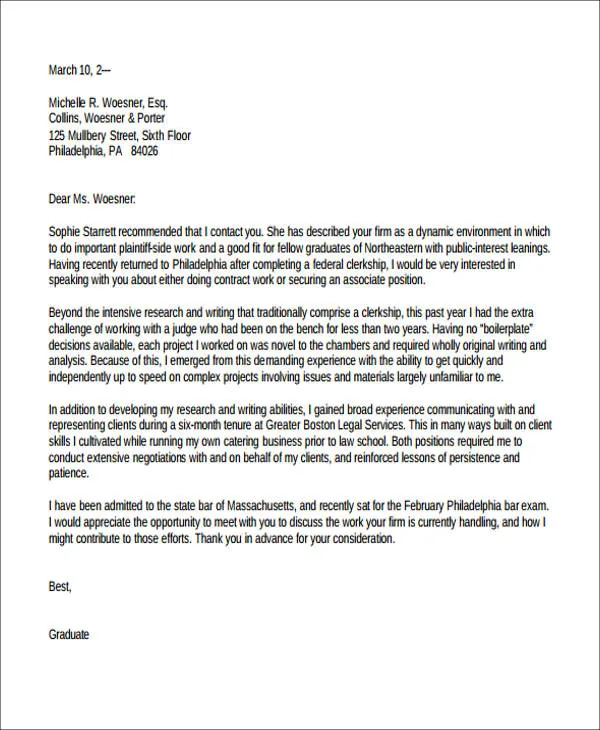
The body of your cover letter is where you elaborate on your qualifications. Focus on the skills and experiences that are most relevant to the internship. Use specific examples to demonstrate your abilities, rather than just listing them. For instance, instead of saying “Strong research skills,” describe a specific research project you undertook and the results you achieved. Use action verbs to describe your accomplishments.
Academic Achievements and Relevant Coursework
Mention any relevant academic achievements, such as high grades in specific courses, honors, or awards. Highlight coursework that aligns with the internship’s focus, such as constitutional law, criminal justice, or contract law. Explain how the knowledge gained in these courses will benefit you in the role.
Previous Work Experience
Describe any previous work experience, including part-time jobs, internships, or volunteer work. Focus on the skills you developed in these roles that are transferable to the internship, such as communication, teamwork, problem-solving, and time management. Quantify your accomplishments whenever possible.
Showcase Your Passion for Law
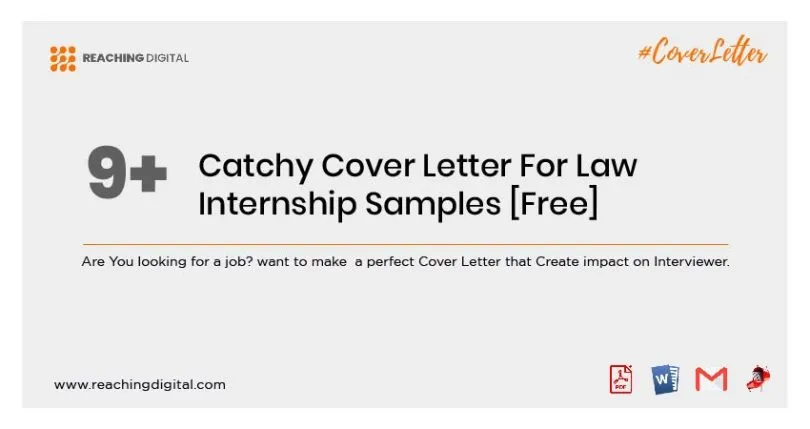
Demonstrate your genuine interest in the legal field and why you want to pursue a law student internship. Discuss your long-term career goals and how this internship aligns with your aspirations. Mention any specific areas of law that interest you and explain why. This shows the hiring manager that you have a clear vision for your future and are committed to a career in law.
Why You’re Interested in This Specific Internship
Tailor your cover letter to each specific internship by explaining why you are interested in this particular opportunity. Research the firm or organization and mention specific aspects of their work that appeal to you. Show that you have a good understanding of the company’s mission, values, and areas of practice. This demonstrates your genuine interest and that you have taken the time to learn about the organization.
Demonstrate Your Understanding of the Firm/Organization
Show that you have done your homework by demonstrating your understanding of the firm or organization’s work. Mention any recent cases, projects, or initiatives that have caught your attention. Explain how your skills and experience align with the firm’s values and goals. This shows that you’re not just looking for any internship; you’re genuinely interested in this specific opportunity.
Call to Action and Closing
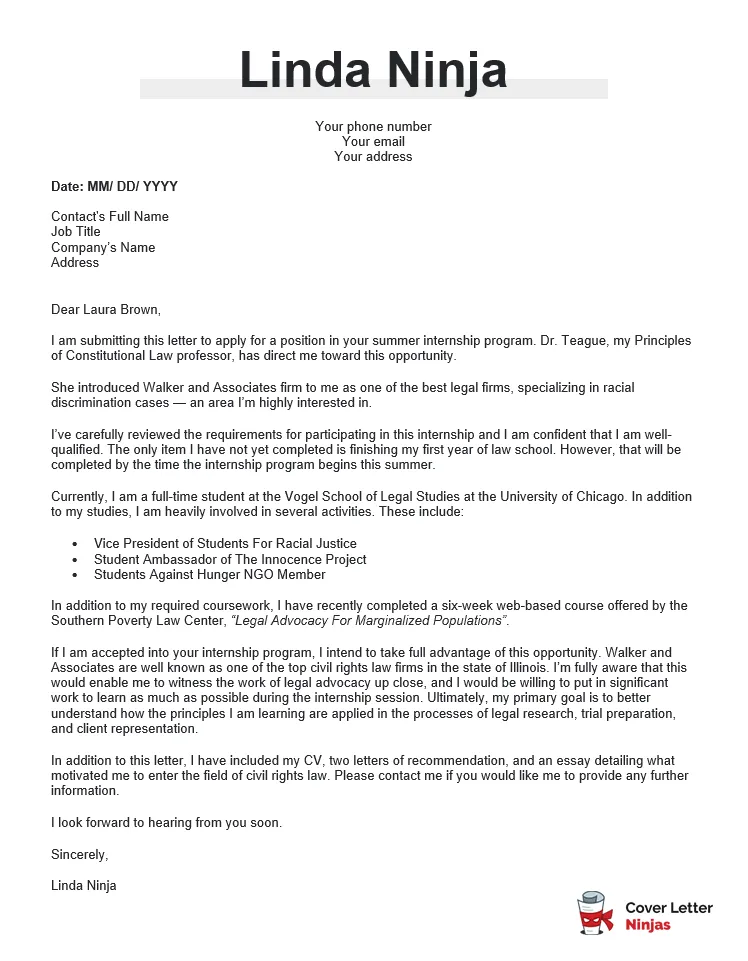
In your closing paragraph, reiterate your enthusiasm for the internship and thank the hiring manager for their time and consideration. Include a call to action, such as expressing your availability for an interview. End with a professional closing, such as “Sincerely” or “Best regards,” followed by your typed name.
Proofread and Edit Meticulously
Before submitting your cover letter, carefully proofread it for any grammatical errors, spelling mistakes, or typos. Ask a friend, professor, or career counselor to review your letter as well. Errors can detract from your professionalism and make a negative impression on the hiring manager. Double-check the recipient’s name and the firm’s name for accuracy.
Formatting and Presentation
The appearance of your cover letter is just as important as its content. A well-formatted letter demonstrates professionalism and attention to detail. Clear and easy-to-read formatting enhances the overall impact of your application. The layout of your cover letter can significantly influence how your qualifications are perceived. Use a professional format to ensure it’s easy to read.
Choosing the Right Font and Font Size
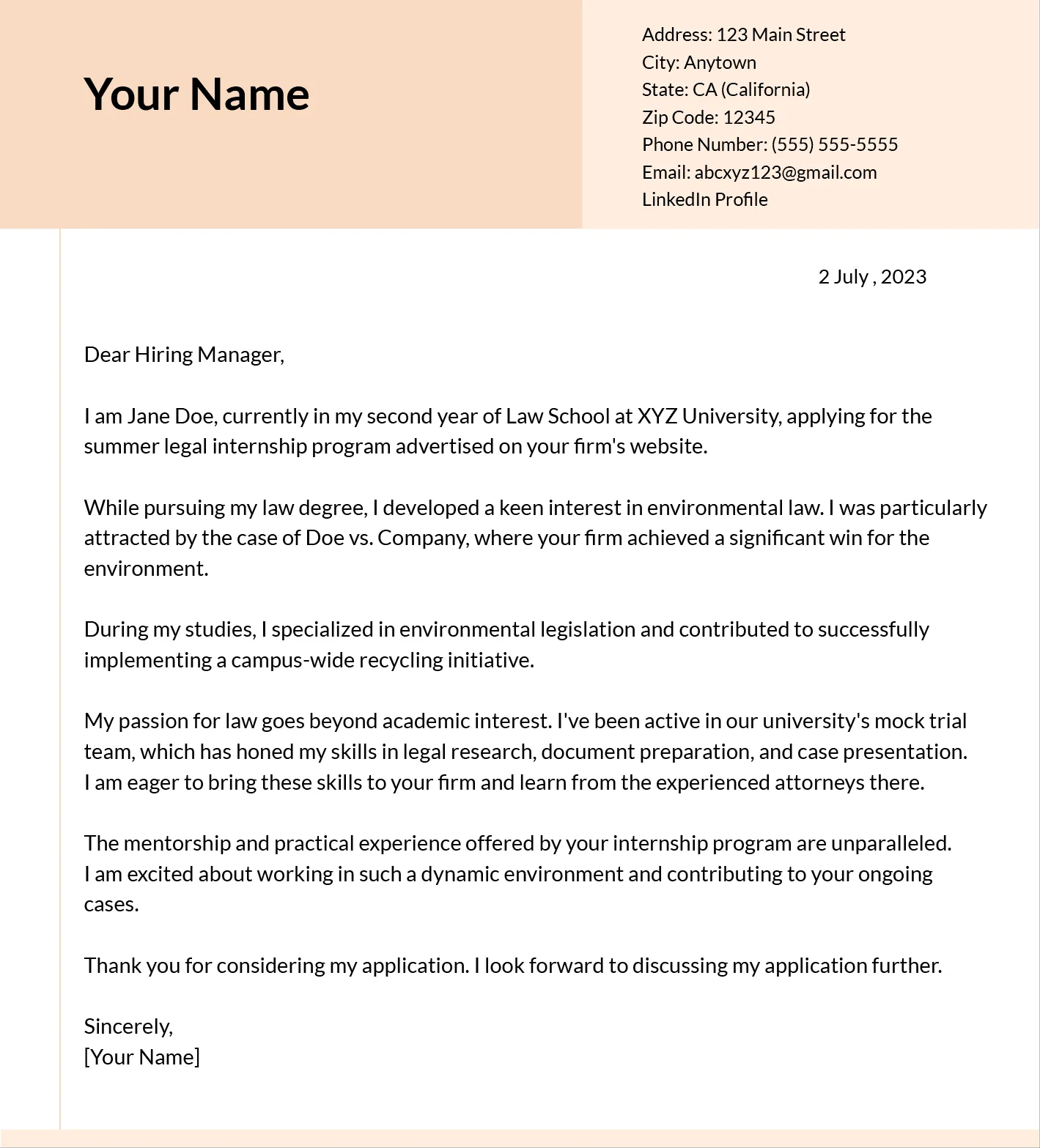
Choose a professional font, such as Times New Roman, Arial, or Calibri. Use a font size between 10 and 12 points for readability. Ensure the font is consistent throughout the document. Avoid using overly decorative fonts or fonts that are difficult to read.
Proper Use of White Space
Use white space effectively to make your cover letter visually appealing and easy to read. Use standard margins (1 inch on all sides) and single-space the body of the letter. Use a blank line between paragraphs to create visual separation. This helps the hiring manager focus on your content without feeling overwhelmed.
File Format and Submission
Save your cover letter as a PDF to preserve the formatting and ensure it appears the same on any computer. Name the file with your name and the position you’re applying for (e.g., “JohnDoe_CoverLetter_Internship”). Follow the instructions provided by the employer regarding the submission process. If no instructions are given, send your cover letter and resume as attachments via email.
Examples of Strong Law Student Internship Cover Letters
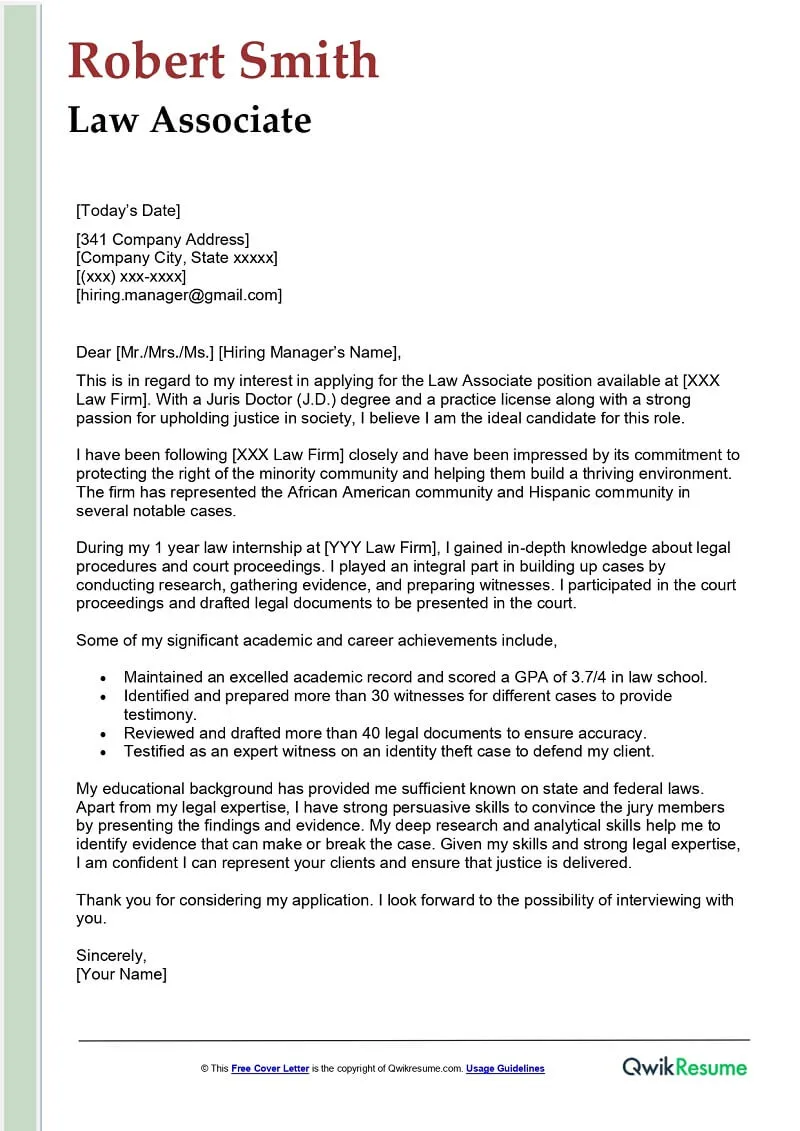
Reviewing examples of strong cover letters can provide valuable insights into how to structure your own. Look for examples that showcase effective writing, highlight relevant skills, and demonstrate a genuine interest in the internship. Analyze how these examples address the key components discussed above. Consider the tone, language, and formatting used in these successful applications. Several online resources offer templates and examples tailored for law students seeking internships.
Cover Letter Template for Law Student Internships
Using a cover letter template can help you create a well-structured letter quickly and efficiently. Many templates are available online, specifically designed for law student internships. Customize the template to reflect your unique qualifications and the specific requirements of the internship. Ensure the template aligns with the key components of a winning cover letter, as outlined above. Remember to personalize the template with your own information and tailor it to the specific internship you are applying for.
Common Mistakes to Avoid in Your Cover Letter
Avoid common mistakes that can undermine your application. These mistakes include grammatical errors, typos, generic language, and a lack of personalization. Avoid providing irrelevant information or exaggerating your accomplishments. Do not simply repeat your resume; instead, elaborate on your experiences and highlight your skills. Finally, make sure to address the specific requirements of the internship and avoid submitting a generic cover letter. By avoiding these mistakes, you will increase your chances of making a strong first impression.
By following these guidelines and investing the time to craft a compelling cover letter, you’ll significantly increase your chances of landing a law student internship. Good luck with your applications!
